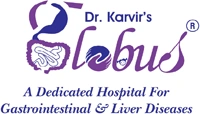FAQ's
Gastroscopy is a type of endoscopic procedure that enables your physician to examine the lining of the upper part of your gastrointestinal tract, i.e. the Esophagus (food pipe), Stomach and Duodenum (first portion of the small intestine) using a thin flexible tube with its own lens and light source. Upper endoscopy is usually performed to evaluate symptoms of persistent upper abdominal burning pain, nausea, vomiting or difficulty in swallowing. It is also the best test for finding the cause of bleeding from the upper gastrointestinal tract. The procedure is painless and is routinely done under local anaesthesia throat spray. Sometimes in special cases; it can be done under sedation or Mild short acting Anaesthesia.
It is a procedure that helps to examine the lining of the large intestine by inserting a flexible tube called Colonoscope into the anus and advancing it further upto terminal ileum (last part of small Intestine). If the doctor sees an area that needs evaluation in greater detail, a biopsy (sample of the colon lining) may be obtained which is painless and submitted to a laboratory for Histopathological analysis. The procedure is done under sedation or Anaesthesia & hence is painless.
ERCP is a procedure that enables your physician to examine the pancreatic duct and bile duct (Duct connecting Gall bladder to intestines). A specially designed Side Viewing Endoscope (SVE) is passed through the mouth and into your stomach and first part of the small intestine (duodenum). In the duodenum a small opening is identified (ampulla) and a small plastic tube (cannula) is passed through the endoscope and into this opening. Dye (contrast material) is injected and X-rays are taken to study the ducts of the pancreas and liver. Bile duct stones which are impacted can be diagnosed and removed with an ERCP. Tumors, both cancerous and noncancerous, can be diagnosed and then treated with placing plastic or metal tubes (stents) that are used to bypass a blockage of the bile duct.
Children are not just small adults. Their bodies are growing and have unique medical needs. They usually express their concerns differently than adults. Digestive, liver, and nutritional problems in children often are quite different from those seen in adults. Specialized training and experience in pediatric gastroenterology are important. Pediatric gastroenterologists treat children from the newborn period through the teen years. They choose to make pediatric care the core of their medical practice, which provides extensive experience specifically in the care of infants, children, and teens. If your child has a digestive system, liver, or nutritional problem, a pediatric gastroenterologist has the expertise to treat them. They focus on problems unique to pediatric patients, including growth, maturation, physical and emotional development, and age-related social issues. They also treat bleeding, swallowing problems, or other problems encountered in the intestines. Special instruments, such as endoscopes, are used to examine the inside of the digestive tract or obtain tissue samples (biopsies). Endoscopic procedures pediatric gastroenterologists perform include Oesophagogastroduodenoscopy (OGD scopy) and Colonoscopy.
Pediatric gastroenterologists generally provide treatment for the following: Acute or chronic abdominal pain Vomiting Difficulty in swallowing (Dysphagia) Abdominal distension Severe or complicated gastroesophageal reflux disease (reflux or GERD) Chronic constipation including Hirschsprung’s disease Chronic/ Persistent/ Protracted diarrhea Failure to thrive Lactose intolerance Food allergies or intolerances Bleeding from the gastrointestinal tract (Hematemesis / Malena / Hematochezia) Foreign Body Ingestions Corrosive Poisoning Jaundice Acute / Chronic Liver Failure If your doctor suggests that your child see a pediatric gastroenterologist, you can be assured that your child will receive the best possible care.
Others Condition:
Bloating | Cancers of Stomach, Intestine & Liver | Constipation | Hirshsprung’s Disease | Gallstone | Dysphagia | Inflammatory Bowel Disease | Pancreatitis | SIBO | Barrett’s Esophagus | Blood in Stools / Vomitus | Celiac Disease | Diarrhea | Fatty Liver | Gerd | Irritable Bowel Syndrome | Piles


